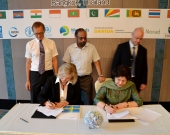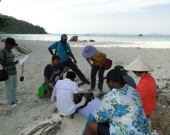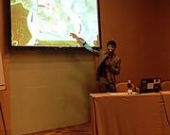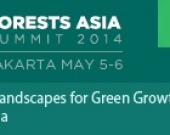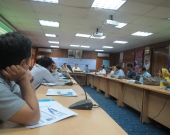Newsroom :: Newsletter :: MFF Newsletter 32
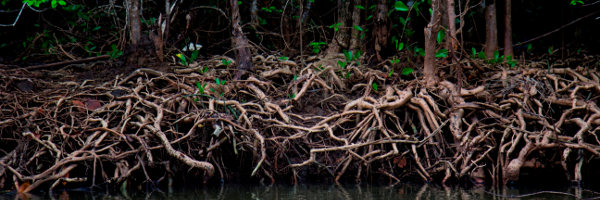
|
Mangroves for the Future Newsletter - Issue 32
1st Jun 2014 - 15th Aug 2014
This newsletter will be brief, coming as it does at the start of the new phase of Mangroves for the Future (MFF) which was launched in June with a signing ceremony in Bangkok with the Swedish International Development Agency (Sida). The new phase will run from 2014 to 2018, which gives MFF an extraordinary opportunity to make a significant impact on coastal issues in each of the 10 countries where we work, and to test and share new models and approaches.
Of course, none of this could have happened without the dedicated team that we have in place – from the committed members of our National Coordinating Bodies to our partners and the hard-working national and regional staff teams. Over the past seven years they have helped to guide the evolution of MFF from what was primarily a disaster response and reconstruction effort in the six countries worst-affected by the 2004 tsunami, to a robust regional initiative operating in 10 countries.
The growth of MFF is a good indicator of its continued relevance. Coastal communities in many parts of Asia are particularly vulnerable to the impacts of climate change and natural disasters. Over the past seven years, MFF projects have clearly demonstrated how healthy coastal ecosystems can play a major role in helping coastal communities adapt to these impacts; supporting biodiversity conservation; and improving people’s lives, while also providing cost-effective risk reduction against such threats as coastal erosion, storm surges and tsunamis.
The launch of the new funding was followed closely by the Inception Meeting for Phase 3, on June 12 and 13. The meeting brought together representatives of the National Coordinating Bodies from all the countries involved in MFF along with our partners – IUCN, FAO, UNDP, UNEP and Wetlands International -- and representatives of Sida.
The focus at the Inception Meeting was on refining the MFF model to deliver even better results. Moving forward, MFF will continue to develop resilience in ecosystem-dependent coastal communities and to build on its efforts to influence coastal management policy with an increased emphasis on “soft governance”. We'll also be expanding the hands-on training and learning opportunities we provide for coastal management practitioners around the region, starting with the fourth run of the ICM Course in Bangkok this August and September.
In addition, Phase 3 will see greater emphasis on engaging with the private sector, both to harness the resources of the sector, and to work with companies to ensure that they are having a positive impact on coastal ecosystems and communities. The proactive focus will be on working with companies in the coastal tourism and fisheries and aquaculture sectors. Examples of this kind of engagement include the very successful Green Fins project developed in partnership with UNEP.
The next phase of MFF presents many new challenges as we look to develop our current structures so that they can deliver even more effectively and make our ambitious plans a reality. Each of the countries will now begin work on revising and updating their National Strategies and Action Plans (NSAPs) so that they integrate the resilience framework, address the country’s most pressing priorities, and clearly establish a roadmap for future development and growth.
In October, the 11th Regional Steering Committee will be hosted by our newest member country, Cambodia, and will focus on rolling out a new results framework as well as on detailed planning for sustainable financing for MFF, ensuring that the initiative and its legacy live on beyond 2018. Read more about the RSC-11 meeting.
Please continue to visit our website on a regular basis, and stay tuned for more news and updates on the progress and joint effort to secure a resilient future for our coastal ecosystems. Thank you for your support!
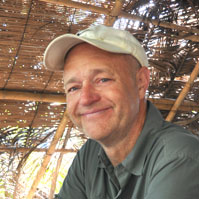
Steen Christensen
Coordinator
Mangroves For The Future
MFF online survey
Please take a short online survey to help make the MFF newsletter better: Take Survey
Regional Activities
Launch of New Funding for Mangroves for the Future
Bangkok, Thailand 10 Jun 2014
IUCN, UNDP and the Swedish International Development Cooperation Agency (Sida) today announced the launch of the third phase of the Mangroves for the Future (MFF) regional initiative with new funding from Sida. The new phase will run from 2014-2018 and will build on the significant achievements realized by MFF over the past seven years. IUCN Asia Regional Director Aban Marker Kabraji and AnnaMaria Oltorp Head of Development Cooperation, Sida launched MFF Phase 3 at a signing ceremony held in Bangkok.
4th Integrated Coastal Management course kickstarts new learning opportunities for Asia coastal managers
Bangkok, Thailand 18 Aug 2014
The postgraduate certificate course on Integrated Coastal Management introduces the concept, principles, process and tools of ICM, and provides an opportunity to learn from integrated coastal management programs and experiences from around the world with a focus on the Asia Region.
The Bangkok Declaration 2014: Committing to Disaster Risk Reduction in Asia
Bangkok, Thailand 23 Jul 2014
Hosted by the Royal Thai Government, the 6th Asian Ministerial Conference on Disaster Risk Reduction (AMCDRR) was held in Bangkok from 22-26 June 2014, with the theme “Promoting Investments for Resilient Nations and Communities”. The objective was to assure a commitment to DRR from all participating stakeholders; ranging from national governments to civil society and international organisations. During this Conference, Mangroves for the Future was a panelist at a side-event organized by IUCN.
Mangroves and climate change given spotlight at 2014 Forest Asia Summit
Jakarta, Indonesia 05 May 2014
Mangroves for the Future (MFF) was proud to host a side-event May 5, on the topic “Managing mangrove forests for climate change adaptation and mitigation benefits,” at the 2014 Forest Asia Summit organized by the Centre for International Forestry Resarch (CIFOR). The theme of the Summit was “Sustainable Landscapes for Green Growth in South East Asia”.
Country Updates
Ecosystem Based Management and shared governance as solutions to address climate change impact on coastal fishery
Dhaka, Bangladesh 06 Jul 2014
Ecosystems based management is the best solution to address the climate change impact on coastal fishery in Bangladesh. it requires integrated action and policy implication in the grassroots. This was discussed in a seminar in Dhaka on 06 July 2014 titled “Fisheries, climate change resilience and nature based solutions: Focus on Coastal Rivers”. Jointly organized by Mangroves for the Future (MFF), Ecosystems for Life and Dept. of Fisheries (DoF), the seminar was attended by researchers, policy practitioners and civil society.
Links, Resources and Publications
Events & Others
- 4th Postgraduate Certificate Course on Integrated Coastal Management (ICM) - August 18th to September 26th, Bangkok, Thailand
- 11th MFF Regional Steering Committee (RSC) Meeting - October 26th to 28th, Preah Sihanouk, Cambodia
